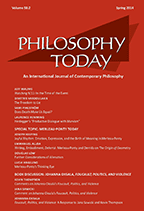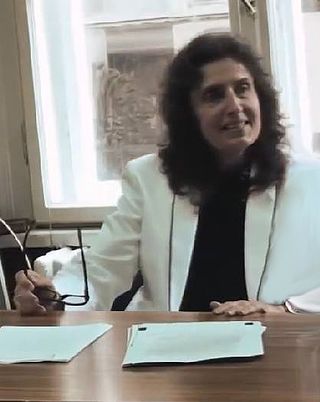Related Research Articles

Hans-Georg Gadamer was a German philosopher of the continental tradition, best known for his 1960 magnum opus on hermeneutics, Truth and Method.

Hermeneutics is the theory and methodology of interpretation, especially the interpretation of biblical texts, wisdom literature, and philosophical texts. As necessary, hermeneutics may include the art of understanding and communication.
Continental philosophy is an umbrella term for philosophies prominent in continental Europe. Michael E. Rosen has ventured to identify common themes that typically characterize continental philosophy. These themes proposed by Rosen derive from a broadly Kantian thesis that knowledge, experience, and reality are bound and shaped by conditions best understood through philosophical reflection rather than exclusively empirical inquiry.
Contemporary philosophy is the present period in the history of Western philosophy beginning at the early 20th century with the increasing professionalization of the discipline and the rise of analytic and continental philosophy.

The American Philosophical Association (APA) is the main professional organization for philosophers in the United States. Founded in 1900, its mission is to promote the exchange of ideas among philosophers, to encourage creative and scholarly activity in philosophy, to facilitate the professional work and teaching of philosophers, and to represent philosophy as a discipline. The APA's governance has included Robert Audi, Jaegwon Kim and Ruth Barcan Marcus.
Hugh J. Silverman was an American philosopher and cultural theorist whose writing, lecturing, teaching, editing, and international conferencing participated in the development of a postmodern network. He was executive director of the International Association for Philosophy and Literature and professor of philosophy and comparative literary and cultural studies at Stony Brook University, where he was also affiliated with the Department of Art and the Department of European Languages, Literatures, and Cultures. He was program director for the Stony Brook Advanced Graduate Certificate in Art and Philosophy. He was also co-founder and co-director of the annual International Philosophical Seminar since 1991 in South Tyrol, Italy. From 1980 to 1986, he served as executive co-director of the Society for Phenomenology and Existential Philosophy. His work draws upon deconstruction, hermeneutics, semiotics, phenomenology, aesthetics, art theory, film theory, and the archeology of knowledge.
The Karl Jaspers Society of North America (KJSNA) is a philosophy organization founded on December 28, 1980 by George B. Pepper, Edith Ehrlich, and Leonard H. Ehrlich to promote study and research on the ideas of Karl Jaspers and related issues in continental philosophy. The prospect of forming this society emerged from the research by these scholars while preparing a systematic reader of the basic philosophical writings of Karl Jaspers. Enthusiastic response to the reader prompted Pepper and Ehrlich to conclude that a learned society to study the work of Jaspers should be founded.
The Society for Phenomenology and Existential Philosophy (SPEP) is a philosophical society whose initial purpose was to promote the study of phenomenology and existentialism but has since expanded to a wide array of contemporary philosophical pursuits, including critical theory, feminist philosophy, poststructuralism, critical race theory, and increasingly non-Eurocentric philosophies. SPEP was created in 1962 by American philosophers who were interested in Continental philosophy and were dissatisfied with the analytic dominance of the American Philosophical Association. It has since emerged as the second most important philosophical society in the United States. Antonio Calcagno and Shannon Mussett are the current Executive Co-Directors of SPEP.
The following is a bibliography of John D. Caputo's works. Caputo is an American philosopher closely associated with postmodern Christianity.

Philosophy Today is an international peer-reviewed journal that reflects the current questions, topics and debates of contemporary philosophy, with a particular focus on continental philosophy.

Andrzej Wierciński is a hermeneutician, philosopher, and theologian. As the transdisciplinary thinker, he is Professor of Liberal Arts, Faculty of Artes Liberales at the University of Warsaw, President-Founder (2001) of the International Institute for Hermeneutics (IIH), and President of Agora Hermeneutica (IIH).

Yvanka B. Raynova is a Bulgarian philosopher, feminist, editor, translator, and publisher. She is full professor of contemporary philosophy at the Institute of Philosophy and Sociology at the Bulgarian Academy of Sciences and director of the Institute for Axiological Research in Vienna. She elaborated a post-personalist hermeneutic phenomenology based on some gnostic ideas. Her works include studies on continental philosophy, phenomenology, hermeneutics, axiology, feminist philosophy, intercultural philosophy, religious studies, and translation studies.
Patrick Aidan Heelan, S.J. was an Irish Jesuit priest, physicist, and philosopher of science. He was William A. Gaston Professor of Philosophy at Georgetown University.
José Medina is Walter Hill Scott professor of Philosophy at Northwestern University. He is a member of the American Philosophical Association, the British Wittgenstein Society, the North American Wittgenstein Society, the Society for the Advancement of American Philosophy, the Society for Phenomenology and Existential Philosophy (SPEP), the Southern Society for Philosophy and Psychology, and the Tennessee Philosophical Association.
Theodore D. George is an American philosopher and professor and chair of the department of philosophy at Texas A&M University. He is known for his expertise on post-Kantian philosophy and hermeneutics, in particular, his work on Hans-Georg Gadamer. George is the editor of Epoché: A Journal for the History of Philosophy. He was the president of North American Society for Philosophical Hermeneutics between 2013 and 2016.

Cynthia R. Nielsen is an American philosopher and Professor of Philosophy at the University of Dallas. She is known for her expertise in the field of hermeneutics, the philosophy of music, aesthetics, ethics, and social philosophy. Since 2015 she has taught at the University of Dallas. Prior to her appointment at the University of Dallas, she taught at Villanova University as a Catherine of Sienna Fellow in the Ethics ProgramArchived 2018-12-19 at the Wayback Machine. Nielsen serves on the executive committee of the North American Society for Philosophical Hermeneutics.

The British Society for Phenomenology (BSP) is an organisation whose purpose is to pursue and exchange philosophical ideas inspired by phenomenology. It was established in 1967 by Wolfe Mays. The current president of the BSP is Dr Keith Crome. The society accomplishes its aims through a journal, an annual conference (as well as other events), and a podcast.
Nicholas Davey is a British philosopher and professor of philosophy at the University of Dundee. He is known for his expertise in aesthetics, hermeneutics, and his work on Hans-Georg Gadamer. Davey has also played a leading role in founding several research groups and institutes at the University of Dundee, which include Theoros, Hermeneutica Scotia, and the university's Arts and Humanities Research Institute.
James Conrad Risser is an American philosopher and Professor of Philosophy at Seattle University. He was Pigott-McCone Endowed Chair of Humanities between 1991 and 1994 and the president of the North American Society of Philosophical Hermeneutics (2012–2015).

Hans-Herbert Kögler, is a German-American philosopher.
References
- ↑ Lester, Embree; Thomas, Nenon (1 January 2007). Phenomenology 2005. Volume 5: Selected Essays from North America, part 2. Zeta Books. ISBN 9789738863262 . Retrieved 19 June 2017.
- ↑ Maoilearca, John Ó; Lord, Beth (25 June 2009). The Continuum Companion to Continental Philosophy. A&C Black. ISBN 9781441128904 . Retrieved 19 June 2017.
- ↑ "North American Society for Philosophical Hermeneutics Annual Conference, DePaul, Sept. 27 - Philosophy at Loyola". blogs.luc.edu. 22 September 2013. Retrieved 19 June 2017.
- ↑ "NASPH website" . Retrieved 19 January 2019.
- ↑ "James Risser CV" (PDF). Retrieved 19 January 2019.
- ↑ "SPEP Conference Program 2018 (p. 27)" (PDF). Retrieved 19 January 2019.
- ↑ "NASPH Documents" . Retrieved 19 January 2019.
- ↑ "American Philosophical Association Affiliated Groups" . Retrieved 20 January 2019.
- ↑ "Society for Phenomenology and Existential Philosophy" (PDF). www.spep.org. Retrieved 10 October 2021.